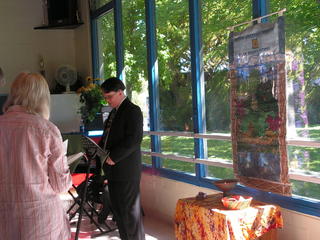My six year old tends to think that all that matters is fairness. And by this she really means sameness. If her brother gets a snack, she should get a snack, even if she has already eaten. If her brother gets two of something that she only had one of, she figures that entitles her to have two the next day while he gets none. We try to explain to her that fairness is complicated sometimes and not always what she wants. If her little brother goes to bed early because he didn't nap, should we send her to bed early just to be fair? If her older brother only gets one present (because it is more expensive and electronic) does that mean she can only get one?
To me it feels like she can only focus on one virtue at a time. And it seems to me that she is not alone in this regard.
Most of the adolescents I have had the joy and concern to work wth over the years tend to fixate on freedom as the one and only virtue. It seems to me that many people I know and many UUs seem to be this way too.
It seems silly to say so, but committment and belonging are just as important as freedom. I'm reminded of Robert Bellah's Habits of the Heart and the idea that liberals in particular have been won over by a psychotherapeutic expressionist sense of identity that degrades all social bonds to reciprocal contractarianism ("for as long as we both shall love").
There is a line is
Bowles and Gintis book
Schooling in Capitalist America that suggests that the function of schooling in a capitalist society is to render the individual sufficiently fragmented in consciousness such that s/he is unable to consider collective solutions to problems. The book is problematic in lots of ways, but I do find this section useful:
"To reproduce the social relations of production, the educational system must try to teach people to be property subordinate and render them sufficiently fragmented in consciousness to preclude their getting together to shape their own material existence. The forms of consciousness and behavior fostered by the educational system must themselves be alienated, in the sense that they conform neither to the dictates of technology in the struggle with nature, nor to the inherent developmental capacities of individuals, but rather to the needs of the capitalist class. It is the prerogatives of capital and the imperatives of profit, not human capacities and technical realities, which render U.S. schooling what it is. This is our charge."
Earlier in my life, I was more explicitly involved on the political left. I found myself often trying to explain how the version of individualistic freedom that was inherited from the mainstream commercial culture was not really as big a virtue as we might like.
As an anarchist I often worked to point out things like
The Tyranny of Structurelessness
and how a fear of explicit structure can be worse than having some structure to work with.
Recently I wrote a paper about how certain discourses around purity and sacrifice within radical anarchist, environmental and animal rights activism show a clear inheritance from Christian rhetoric around vicarious atonement and theological purity.
I don't think it is a bad thing to acknowledge this inheritance and it should not denigrate in any way either Christianity or radical social movements.
It's just yet again evidence that no one exists in a social vacuum. I'm not going to go all the way into "creative interchange" and the decentralization of the individual (although Rebecca Parker did a great presentation on this at the Process Theology Network's workshop at General Asssembly). Personally, I'm still an existentialist and believe in the possibility of individual agency. But like Vygotsky, I believe that there is a dialectic between the social and the organic.


